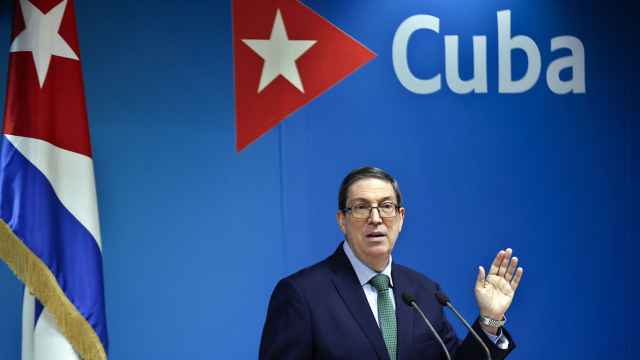The government set the starting price for the Trebs and Titov oil fields at 18.2 billion rubles ($603 million), but the winning bidder will have to sell 15 percent of the fields' crude on an exchange and refine 42 percent in Russia.
Analysts said the conditions for the sale, published Tuesday by the Federal Subsoil Resource Use Agency, would make the project less attractive to potential investors.
The starting price for the fields had been a point of contention within the government, with the Energy Ministry insisting that the assets should be sold for 60 billion rubles. A ministry spokesperson declined comment.
But the subsoil agency, which reports to the Natural Resources and Environment Ministry, said the bidding for the fields as one lot would start at 18.171 billion rubles.
Trebs and Titov have combined C1 reserves of 89.73 million tons, the agency said. The tender will be held Dec. 2, while all bids must be submitted by Sept. 20.
Foreign companies will be allowed to bid for the strategic fields, but only in a consortium controlled by a Russian state company, a Natural Resources and Environment Ministry spokesperson said. The foreign company would also need to be approved by the government's commission on foreign investments.
Virtually all the country's largest oil holdings have expressed interest in the fields, including LUKoil, Rosneft, Gazprom Neft, TNK-BP and Bashneft. Spokespeople for all five confirmed their interest Tuesday, but said a final decision on whether to bid would only be made after the terms of the tender had been studied.
Spokespeople for Zarubezhneft and Surgutneftegaz declined comment. India's state-run ONGC has expressed interest in the project and is in talks on creating a consortium with Rosneft. A Gazprom Neft spokesperson said the company could bid jointly with a foreign firm but declined to name the possible partner.
A source at one of the oil companies said the terms of the tender had left a mixed impression. The starting price is promising, but the demands made of the winning bidder significantly reduce the project's profitability.
Of particular concern is the requirement that 15 percent of the fields' output be sold on the Russian Commodities Exchange and that no less than 42 percent of the crude be refined in Russia.
A LUKoil export pipeline runs near the fields, delivering oil to the Varandeisky terminal for export. But according to the published rules, the oil produced from Trebs and Titov would need to be refined and could not be swapped for crude produced at other fields nearer refineries.
That means the investor would be required to build a new pipe to Transneft's pipeline in the village of Usa, the oil industry source said.
"That's hundreds of kilometers, which significantly increases costs for the investors. And forcing the investors to mix the high-quality oil from Trebs and Titov with lower-grade sorts in the shared pipeline would deprive them of another source of income," he said.
Allowing swap operations on the oil would have prevented small oil companies from competing in the tender, the Natural Resources and Environment Ministry official said.
Bank of Moscow analyst Denis Borisov said the ban on swaps would complicate the project for Rosneft and Bashneft, whose nearest refineries are located in Samara and Ufa. There's no feasible way to deliver oil to the plants from Trebs and Titov because pipelines heading to the refineries work only in one direction.
The requirement to sell part of the crude on an exchange is pointless, since there isn't any real operating oil exchange in Russia, said Lev Snykov, an analyst at VTB Capital.
It is possible that by 2013, when the fields begin production, a hydrocarbons exchange will have started operating, but it is unclear how profitable those sales would be for companies, he said.
Earlier this year, the Federal Anti-Monopoly Service proposed that terms for new licenses be "toughened" by requiring that producers sell part of their crude on a Russian exchange. Deputy Prime Minister Igor Sechin, the government's top energy official, backed the proposal.
"From an economic point of view, Trebs and Titov should be focused on exports. It's pointless to blindly set conditions about refining or selling oil on an exchange," Snykov said.
A Message from The Moscow Times:
Dear readers,
We are facing unprecedented challenges. Russia's Prosecutor General's Office has designated The Moscow Times as an "undesirable" organization, criminalizing our work and putting our staff at risk of prosecution. This follows our earlier unjust labeling as a "foreign agent."
These actions are direct attempts to silence independent journalism in Russia. The authorities claim our work "discredits the decisions of the Russian leadership." We see things differently: we strive to provide accurate, unbiased reporting on Russia.
We, the journalists of The Moscow Times, refuse to be silenced. But to continue our work, we need your help.
Your support, no matter how small, makes a world of difference. If you can, please support us monthly starting from just $2. It's quick to set up, and every contribution makes a significant impact.
By supporting The Moscow Times, you're defending open, independent journalism in the face of repression. Thank you for standing with us.
Remind me later.





